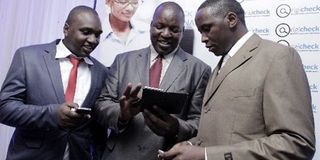The man on a mission to shine light on fake goods

Origicheck chief technology officer Ondieki Obare (left), Origicheck CEO Haron Kiriba (right) and Kenya National Chamber of Commerce and Industry trade development manager Peter Biwott (C) during the launch of Origicheck, anti-counterfeit solution that helps manufacturers track their product in the market. FILE
What you need to know:
- According to Mr Kiriba, the labels can be used on all products irrespective of the colour, shape, and size of an item. The labels are priced per item and cost between one and five shillings depending on the manufacturers’ requests.
- “We did research, trying to read the mind of the counterfeiter, to figure out what products are mostly counterfeited and how best to launch the war against this threat,” Mr Kiriba said.
- He has therefore ensured that in the event of a duplication of labels or a fake product, the system helps locate the enquiring consumer, and narrows down to the specific outlet distributing the product.
From fake phones to illicit alcoholic drinks, the Kenyan market has been raided by unscrupulous traders who are turning counterfeiting into a multi-billion shillings business.
For Mr Haron Kiriba to succeed in his business of importing special light bulbs that can stay on for about six hours after a power blackout, he knew that he had to surmount the potential influx of fakes.
“The light bulb can tell the difference between lights off and lights out. And if after an outage you want to switch the lights off, you simply flick the socket and it detects that to mean lights off,” he said, adding that the bulb goes for Sh1,500.
Mr Kiriba, who is the chief executive of OrigiCheck, said he had to first get it right in terms of assuring his customers of the legitimacy of the bulb before it hit the market.
This is where the OrigiCheck customised labels idea was born.
Armed with about Sh10.12 million ($100,000) borrowed from the bulb’s manufacturer, Mr Kiriba and his team set out to start eliminating counterfeits in the country and in the region.
“We did research, trying to read the mind of the counterfeiter, to figure out what products are mostly counterfeited and how best to launch the war against this threat,” Mr Kiriba said.
Mr Kiriba, with the help of a security firm, he came up with coded label assigned to each item on the shelves that consumers can scratch to reveal unique digits. The label is stuck on each genuine product.
The digits, once sent to the OrigiCheck’s system either through an SMS or through a mobile app cannot be used again.
“Once the consumer sends the unique code to our system, it receives the information and responds with a verification message, showing whether or not the product is original,” Mr Kiriba said.
ALL PRODUCTS
According to Mr Kiriba, the labels can be used on all products irrespective of the colour, shape, and size of an item. The labels are priced per item and cost between one and five shillings depending on the manufacturers’ requests.
Alive to the fact that any product is vulnerable to counterfeiting, Mr Kiriba is also aware that his labels are exposed to the same menace he is fighting.
He has therefore ensured that in the event of a duplication of labels or a fake product, the system helps locate the enquiring consumer, and narrows down to the specific outlet distributing the product.
“Mischievous individuals are likely to fake these labels, what they cannot counterfeit, however, is the information in the secret code that is sent to the system.
If you try to put your self-made codes, the information will come to our system and will alert us that there is a problem. We will also get in touch with the person sending the information and we will catch up with the counterfeiter,” said Mr Kiriba.
He says that electronic items, drugs and beauty products are among the most counterfeited goods. Once a counterfeit product has been identified, OrigiCheck liaises with the anti-counterfeit agency to take appropriate action.
For the entrepreneur however convincing manufacturers to take up these labels has been an uphill task.
“We are in talks with Bidco to have them partner with OrigiCheck to eradicate counterfeiting in the country and indeed in Africa,” he said.
This tool can also be viewed as a plus by manufacturers, as they can have Origicheck conduct surveys on their behalf in terms of consumption of their products, and the age group as well as map out high demand areas.
“This can also be used as a marketing tool. We can work with the manufacturer to come up with the information they would like their consumers to get once they send the verification code to the system.
The response to the consumer comes with this information,” he said. So far he has won over musicians whose original works are pirated resulting to huge losses.





